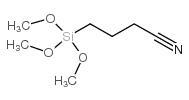55453-24-2
| 中文名 | 3-氰基丙基三甲氧基硅烷 |
|---|---|
| 英文名 | 4-trimethoxysilylbutanenitrile |
| 英文别名 |
EINECS 259-646-9
3-CYANOPROPYLTRIMETHOXYSILANE 4-(Trimethoxysilyl)butyronitrile Butanenitrile,4-(trimethoxysilyl) |
| 密度 | 1.026 |
|---|---|
| 沸点 | 90ºC |
| 熔点 | <0ºC |
| 分子式 | C7H15NO3Si |
| 分子量 | 189.28400 |
| 闪点 | >65ºC |
| 精确质量 | 189.08200 |
| PSA | 51.48000 |
| LogP | 1.16828 |
| 折射率 | 1.416 |
|
Version 1.0
Regulation (EC) No 1907/2006 1 - Product and Company Information Product Name4-(TRIMETHOXYSILYL)-BUTYRONITR - 250 MG ILE 2 - Hazards Identification SPECIAL INDICATION OF HAZARDS TO HUMANS AND THE ENVIRONMENT Irritating to respiratory system and skin. Risk of serious damage to eyes. 3 - Composition/Information on Ingredients Product NameCAS #EC noAnnex I Index Number 4-(TRIMETHOXYSILYL)BUTYRONITRILE 55453-24-2 259-646-9 None FormulaC7H15NO3Si Molecular Weight 189,2800 AMU 4 - First Aid Measures AFTER INHALATION If inhaled, remove to fresh air. If not breathing give artificial respiration. If breathing is difficult, give oxygen. AFTER SKIN CONTACT In case of contact, immediately wash skin with soap and copious amounts of water. AFTER EYE CONTACT In case of contact, immediately flush eyes with copious amounts of water for at least 15 minutes. AFTER INGESTION If swallowed, wash out mouth with water provided person is conscious. Call a physician. 5 - Fire Fighting Measures ALDRICHwww.molbase.com EXTINGUISHING MEDIA Suitable: Water spray. Carbon dioxide, dry chemical powder, or appropriate foam. SPECIAL RISKS Specific Hazard(s): Emits toxic fumes under fire conditions. SPECIAL PROTECTIVE EQUIPMENT FOR FIREFIGHTERS Wear self-contained breathing apparatus and protective clothing to prevent contact with skin and eyes. 6 - Accidental Release Measures PROCEDURE(S) OF PERSONAL PRECAUTION(S) Wear respirator, chemical safety goggles, rubber boots, and heavy rubber gloves. METHODS FOR CLEANING UP Absorb on sand or vermiculite and place in closed containers for disposal. Ventilate area and wash spill site after material pickup is complete. 7 - Handling and Storage HANDLING Directions for Safe Handling: Do not breathe vapor. Avoid contact with eyes, skin, and clothing. Avoid prolonged or repeated exposure. 8 - Exposure Controls / Personal Protection ENGINEERING CONTROLS Mechanical exhaust required. Safety shower and eye bath. GENERAL HYGIENE MEASURES Wash thoroughly after handling. PERSONAL PROTECTIVE EQUIPMENT Respiratory Protection: Use respirators and components tested and approved under appropriate government standards such as NIOSH (US) or CEN (EU). Where risk assessment shows air-purifying respirators are appropriate use a full-face respirator with multi-purpose combination (US) or type ABEK (EN 14387) respirator cartridges as a backup to engineering controls. If the respirator is the sole means of protection, use a full-face supplied air respirator. Hand Protection: Compatible chemical-resistant gloves. Eye Protection: Chemical safety goggles. 9 - Physical and Chemical Properties AppearancePhysical State: Liquid PropertyValueAt Temperature or Pressure pHN/A BP/BP RangeN/A MP/MP RangeN/A Flash PointN/A FlammabilityN/A Autoignition TempN/A ALDRICHwww.molbase.com Oxidizing Properties N/A Explosive Properties N/A Explosion LimitsN/A Vapor PressureN/A Partition Coefficient Log Kow: - 0,904. ViscosityN/A Vapor DensityN/A Saturated Vapor Conc. N/A Evaporation RateN/A Bulk DensityN/A Decomposition Temp.N/A Solvent ContentN/A Water ContentN/A Surface TensionN/A ConductivityN/A Miscellaneous DataN/A SolubilityN/A 10 - Stability and Reactivity STABILITY Stable: Stable. Materials to Avoid: Strong oxidizing agents. HAZARDOUS DECOMPOSITION PRODUCTS Hazardous Decomposition Products: Carbon monoxide, Carbon dioxide, Nitrogen oxides, Silicon oxide. HAZARDOUS POLYMERIZATION Hazardous Polymerization: Will not occur 11 - Toxicological Information SIGNS AND SYMPTOMS OF EXPOSURE To the best of our knowledge, the chemical, physical, and toxicological properties have not been thoroughly investigated. ROUTE OF EXPOSURE Skin Contact: Causes skin irritation. Skin Absorption: May be harmful if absorbed through the skin. Eye Contact: Causes severe eye irritation. Inhalation: Material is irritating to mucous membranes and upper respiratory tract. May be harmful if inhaled. Ingestion: May be harmful if swallowed. 12 - Ecological Information No data available. 13 - Disposal Considerations SUBSTANCE DISPOSAL Contact a licensed professional waste disposal service to dispose of this material. Dissolve or mix the material with a combustible solvent and burn in a chemical incinerator equipped with an afterburner and scrubber. Observe all federal, state, and local environmental regulations. 14 - Transport Information ALDRICHwww.molbase.com RID/ADR Non-hazardous for road transport. IMDG Non-hazardous for sea transport. IATA Non-hazardous for air transport. 15 - Regulatory Information CLASSIFICATION AND LABELING ACCORDING TO EU DIRECTIVES INDICATION OF DANGER: Xi Irritant. R-PHRASES: 37/38-41 Irritating to respiratory system and skin. Risk of serious damage to eyes. S-PHRASES: 26-39 In case of contact with eyes, rinse immediately with plenty of water and seek medical advice. Wear eye/face protection. 16 - Other Information WARRANTY The above information is believed to be correct but does not purport to be all inclusive and shall be used only as a guide. The information in this document is based on the present state of our knowledge and is applicable to the product with regard to appropriate safety precautions. It does not represent any guarantee of the properties of the product. Inc., shall not be held liable for any damage resulting from handling or from contact with the above product. See reverse side of invoice or packing slip for additional terms and conditions of sale. Copyright 2010 Co. License granted to make unlimitedpaper copies for internal use only. DISCLAIMER For R&D use only. Not for drug, household or other uses. ALDRICHwww.molbase.com SECTION 16 - ADDITIONAL INFORMATION N/A |
| 风险声明 (欧洲) | R20/21/22 |
|---|---|
| 安全声明 (欧洲) | 26-28-36/37/39 |


